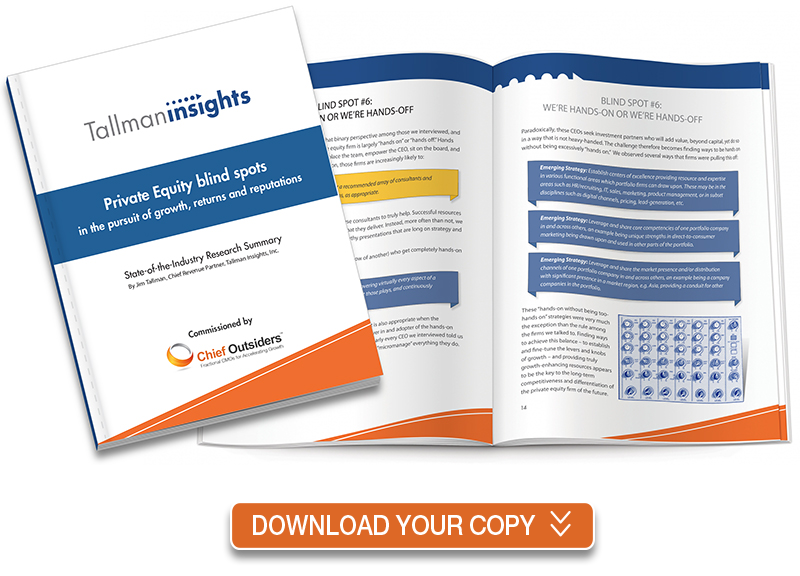Private Equity Blog

3 Keys for Increasing Odds of M&A Success
Solid due diligence on ALL aspects of the business and a fast start on value creation are needed to reach the end-point of a strong ROI for the investors at exit

Recently, I was visiting with a colleague from my days at Waste Management Inc. (WM) reminiscing about a major industry roll-up of which we were a part. Waste Management had decided to create value for shareholders by acquiring and consolidating companies in the very fragmented pest control and lawn care business, creating new national players in the industry.
We were part of the acquisition team – several of us having been owners of acquired companies, plus a long-time WM executive. In two years, our team directed the acquisition and consolidation of over 150 companies, resulting in a roll-up of about $200 million in annual home services revenue. The entire consolidation was eventually sold to ServiceMaster, owner of Terminix. Fast forward to current days, when many of the old problems with M&A are the same, but there’s a new twist. In the world of Private Equity, today’s sky-high valuations require making even smarter decisions when buying a company. Solid due diligence on ALL aspects of the business and a fast start on value creation are needed to reach the end-point of a strong ROI for the investors at exit.
Success Factors
My colleague and I were recounting our M&A successes and messes considering the long-accepted axiom in the corporate world that “most acquisitions fail to achieve their objective.” A Harvard Business Review article states, “…study after study puts the failure rate of (corporate) mergers and acquisitions somewhere between 70% and 90%.” During the Waste Management roll-up days, we did much, much better. As you might imagine, we learned a lot about acquiring, transitioning and consolidating businesses during those two years which I’ll summarize here:
- Financial and operational due diligence: Important, but not enough
We had a team focused almost entirely on financial and operational due diligence on the businesses we were acquiring. They were seasoned pros. But WM recognized that all the numbers and formulas and spreadsheets would not alone assure a successful result - Market/Marketing due diligence: Critical to success
Having a clear understanding of the market positioning and market perception of the acquired companies is essential. Even more so when a company makes add-on acquisitions under the assumption that the newly combined companies will be accretive to real growth and EBITDA for the enterprise. Just a few of the critical questions to ask during market-focused due diligence include: - Customer Perceptions: How does each company present itself? What do customers and potential customers think of each company? And how will that change when the two – or more - companies are merged?
- Products and Pricing: How do the product/service sets and pricing strategies of each company compare? How will they change once the merger is complete?
- Market Gaps: Are there unfilled gaps in the market that present opportunities for the newly acquired or merged company to fill creating additional avenues for future growth?
- Customers Issues
- Is there a customer concentration issue/risk?
- Are customers loyal? How satisfied are they with the products/services they are receiving?
- Will products/services or pricing change post-acquisition? Are customers likely to stay?
- Are the go-to-market strategies of the acquiring and acquired companies compatible? What might be the effect of changes?
- Getting it Done: And how do all these questions (and more) get answered prior to the acquisition? The answer is a combination of basic fact gathering, along with some simple and inexpensive market research. This may be done by the internal due diligence team or by a third-party firm. Elements to be considered should be competitive analysis, market and customer trends and direction, pricing approaches, current marketing and sales strategy, different strategies and resources that will be needed to achieve the desired topline and EBITDA growth.
- Running a company and growing one require different skill sets and talent
Running a company well requires focus on what is happening inside the four walls. That is the area of focus for most operational and financial due diligence. To grow a company, one must focus on the outside – customers, competitors and markets. Bringing this outside focus to the due diligence process significantly raises the odds of success in the transaction.
When taking all the above into consideration, one may be correct in observing that many PE firms skimp on due diligence. Yet, firms are increasingly taking a more comprehensive approach in light of higher up-front valuations and the pressure to increase multiples at exit. If you’d like to explore how a Chief Outsider Fractional CMO can support your due diligence, let’s have a discussion.
Download this insightful study which identifies seven blind spots evident among private equity firms seeking portfolio company growth.
Topics: Fractional CMO, Private Equity
Feb 17, 2020 10:59:00 AMFeatured Chief Outsider

Clay Spitz
Related Articles

- Press Releases
- Careers
- Case Studies
- Marketing Consultant Company
- Marketing Strategy Consultants
- Marketing Plan Consultants
- B2B Marketing Consultants
- Virtual CMO
- Marketing Consultant Outsourcing
- Fractional CMO
- What is a Fractional CMO
- Healthcare Marketing Consultant
- Marketing Consultant Houston TX Texas
- Marketing Consultant Texas TX
- Marketing Consultant Bay Area
- CEO Blog
- Ebooks Plus
- Executive Marketing Consultants
- Product Marketing Consultants
- B2C Marketing Consultants
- Virtual Marketing Consultants
- Senior Marketing Consultants
- Temporary CMO
- Hire a CMO
- Fractional CMO Salary
- Fractional CMO Responsibilities
- Marketing Consultant Austin TX Texas
- Marketing Consultant Dallas TX Texas
- Marketing Consultant San Antonio
- Helping Private Equity
- Private Equity Blog
- Leadership Team
- Privacy Policy
- Business Marketing Consultants
- Strategic Marketing Consultants
- Marketing Technology Consultants
- Sales and Marketing Consultants
- CMO Job Description
- CMO Salary
- Fractional CMO Agency
- Fractional CMO Services
- CPG Marketing Consultant
- Marketing Consultant San Diego
- Partners
Houston, TX 77056
© 2023 Chief Outsiders


